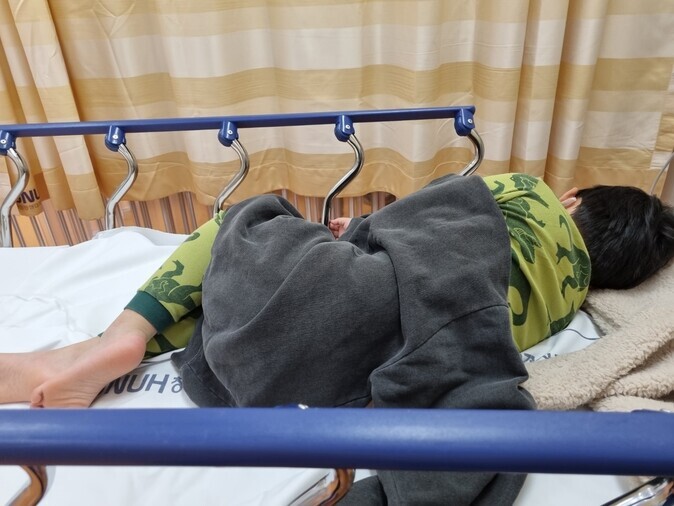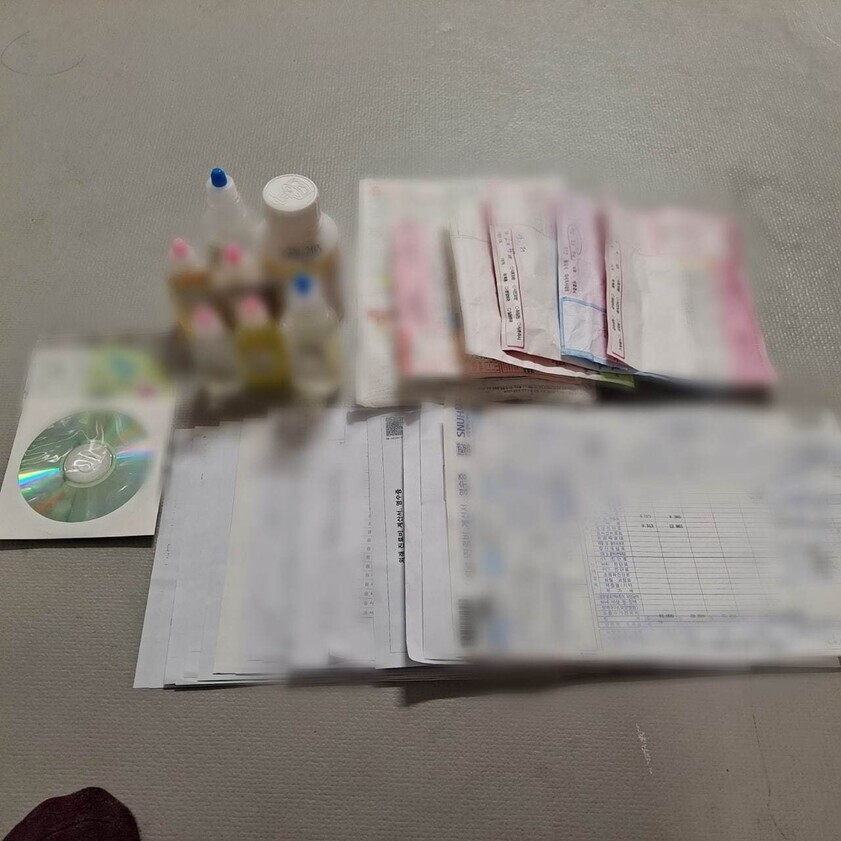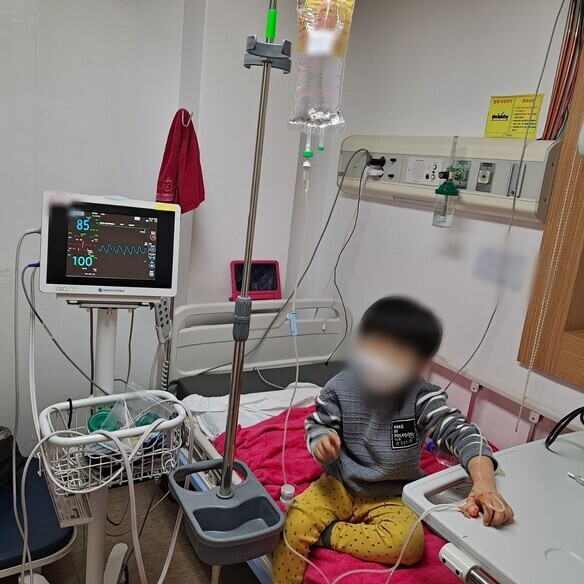hankyoreh
Links to other country sites 다른 나라 사이트 링크
For Korean children with long COVID, normal is nowhere in sight

A middle schooler surnamed Jeong tested positive for COVID-19 on Nov. 17 last year. During his 10-day isolation, he experienced a mild fever and a sore throat, but the symptoms weren’t severe enough to require hospitalization, which made his guardians think his case would be mild.
But the problem began when Jeong was released from isolation. His sense of smell and taste, which had been faint but still functioning, disappeared for a month. Every smell felt like that of nauseating gasoline, and even with a bottle of perfume right under his nostrils, he said he couldn’t smell a thing.
Around the time his sense of smell started to return, unbearable headaches and painful eye pressure ensued. Though he wasn’t the type to express discomfort while sick, Jeong couldn’t help but complain about the pain, which he said felt like his eyes were about to pop out. Frequent vomiting followed as well, and two months after his isolation ended, Jeong had to go to the emergency room in January. Doctors ordered various bloodwork and other panels, worried he might be sick with something else, but the results all came back “normal.”
With 26% of the 14,778,361 cumulative total COVID-19 cases in South Korea being attributed to those under 20 years of age, many children and teenagers, like adults, are reportedly suffering from long COVID, experiencing inexplicable symptoms long after they have been released from isolation. According to data from the UK’s Office of National Statistics, the number of children and teenagers 16 years of age or below suffering from long COVID in the country jumped from 77,000 last October to 119,000 this past January.
Though long COVID figures aren’t yet available in South Korea, since the Omicron wave in the country, many parents have been lamenting the long-term effects of COVID-19 their children have been experiencing on online communities dedicated to the subject.
The Hankyoreh interviewed four parents of children and teenagers who tested positive for COVID-19 and are still experiencing symptoms, and found that young COVID-19 patients suffered from long-term effects similar to that experienced by adults — such as inability to concentrate, headaches, coughing, low-grade fever, skin conditions and enteritis.
Soonchunhyang University professor Kim Tak, who specializes in infectious diseases, said that although he hasn’t yet seen reports that indicate that Delta and Omicron have different long-term effects, “the Delta variant may cause higher rates of irreversible long-term effects caused by lung damage than the Omicron variant because it tends to quickly progress into acute cases.”
Loss of stamina and energy they once hadSince testing positive for COVID-19, the four-year-old daughter of a 35-year-old parent surnamed Kang has been complaining of extremely low stamina. Kang said about their daughter, “She used to be a child who would cry about wanting to play more after six hours at a kids’ cafe, but now, she says she wants to go home after only two hours of playing.” Kang added that they’re worried that their daughter, “who was active and used to love the outdoors, now wants to stay at home all the time.”
Jeong, who used to play basketball three to four times a week, also finds it difficult to work out even once a week since getting COVID. Five-year-old Kang, who was hospitalized in February after getting COVID and experiencing a high fever, is dealing with the same issue.
Kang’s mother, a 45-year-old surnamed Kim, said that her son, “who has always been healthy since getting heart surgery three years ago,” has been complaining of “intestinal spasms, pain in the eyes, and a skin condition that requires medicine” — all since getting COVID.

Complaints about an inability to concentrate and cognitive decline were also frequent. Since getting COVID, Kang hasn’t been able to remember his friends’ names properly. Before, he could recite the names of all his 25 classmates, but now, he finds simply recalling the name of his playground mate difficult. Kang’s mother said about her son, “We’ve had a tutor who’s been teaching him hangul and numerals since last year, and the tutor said his learning ability has fallen significantly. [. . .] He had just skipped a few weeks of classes because of COVID, but I’m so worried that a teacher who’s been working with him for a while is saying his memory and concentration have visibly worsened.”
In the case of Jeong, memorizing the same amount of English vocabulary he used to memorize before COVID now takes an hour longer. Four months have passed since he was released from isolation, but he still deals with symptoms like headaches and lethargy, which he worries are negatively affecting his ability to concentrate even more.
Paik Soon-young, a professor emeritus of microbiology at the Catholic University of Korea, said, “Various cells can be damaged by the virus and lead to long-term effects, which can be the case for neurological symptoms like memory loss and brain fog.” He continued, “Children will inevitably feel the effect of fevers to a higher degree, and infections of the digestive system can be a long-term effect of viral infection.”
Anxiety over symptoms of unknown originBecause children are unable to describe their physical condition clearly, finding out what symptoms they have poses challenges.
Kang said of their four-year-old daughter, “A four-year-old child doesn’t know the term ‘eye pressure,’ so she only says, ‘My eyes feel weird,’ and finds it difficult to exactly describe where she’s hurting.” They went on, “Even when her stomach hurts, she says either ‘I feel sick’ or ‘My tummy hurts,’ so unless I ask detailed questions, it’s hard to determine whether she’s sick.”
“Many parents seem to not worry too much because they say children only experience mild cases,” Kim Tak said, adding, “I think a lot of children feel symptoms; only, we don’t learn about them because they don’t express it. I think closer observation is needed.”
Eight-year-old Baek, who got sick with COVID late last month, suffered from seizure-like headaches on the last day of his isolation. As of Thursday, nine days since his release from isolation, he’s been to the emergency room four times. Though he finally went back to school on Tuesday, he soon experienced symptoms and had to leave school early to go to the emergency room. His father, 38-year-old Baek, said, “He said he felt okay in the morning, so we sent him to school, but he started feeling sick again and had to leave school early, so the intermittent symptoms he’s experiencing make me very anxious.”

Because COVID-19 cases in South Korea peaked later than in other countries, not much research into long COVID has been done in the country. Information about the virus’ long-term effects in children and teenagers is even harder to come by. The UK has already established 15 pediatric hubs specializing in COVID, while research into COVID-19’s long-term effects in children and teenagers is taking place in the US and elsewhere. The US National Institutes of Health recently launched a longitudinal study on the long-term effects of COVID that will follow 1,000 children and teenagers for up to three years.
While eight clinics specializing in treating long-term effects of COVID have opened in South Korea recently, not many of their patients are children or teenagers. During the month of March, Hana ENT Hospital’s COVID-19 recovery clinic treated only eight patients under the age of 20, who accounted for 2.7% of the clinic’s patients during the month. Meanwhile, teenagers who visited Myongji Hospital’s clinic for long-term effects of COVID between March 21 and March 28 numbered three, only 1% of the patients who visited the clinic during the time period.
A 39-year-old parent of a seven-year-old, surnamed Park, said, “More attention should be given to long-term effects [of COVID] in children, and it would be nice if clinics specializing in them were to open.”
Experts agree that research into and support for children and teenagers dealing with the COVID-19 virus’ long-term effects are necessary. Paik said, “More fundamental research into the cause and effect of [COVID’s] long-term effects, especially as they relate to the possibility of long-term, permanent damage in children, are needed.”
By Jang Hyeon-eun, staff reporter
Please direct questions or comments to [english@hani.co.kr]

Editorial・opinion
![[Editorial] Yoon must halt procurement of SM-3 interceptor missiles [Editorial] Yoon must halt procurement of SM-3 interceptor missiles](https://flexible.img.hani.co.kr/flexible/normal/500/300/imgdb/child/2024/0501/17145495551605_1717145495195344.jpg) [Editorial] Yoon must halt procurement of SM-3 interceptor missiles
[Editorial] Yoon must halt procurement of SM-3 interceptor missiles![[Guest essay] Maybe Korea’s rapid population decline is an opportunity, not a crisis [Guest essay] Maybe Korea’s rapid population decline is an opportunity, not a crisis](https://flexible.img.hani.co.kr/flexible/normal/500/300/imgdb/original/2024/0430/9417144634983596.jpg) [Guest essay] Maybe Korea’s rapid population decline is an opportunity, not a crisis
[Guest essay] Maybe Korea’s rapid population decline is an opportunity, not a crisis- [Column] Can Yoon steer diplomacy with Russia, China back on track?
- [Column] Season 2 of special prosecutor probe may be coming to Korea soon
- [Column] Park Geun-hye déjà vu in Yoon Suk-yeol
- [Editorial] New weight of N. Korea’s nuclear threats makes dialogue all the more urgent
- [Guest essay] The real reason Korea’s new right wants to dub Rhee a founding father
- [Column] ‘Choson’: Is it time we start referring to N. Korea in its own terms?
- [Editorial] Japan’s rewriting of history with Korea has gone too far
- [Column] The president’s questionable capacity for dialogue
Most viewed articles
- 1Months and months of overdue wages are pushing migrant workers in Korea into debt
- 2Trump asks why US would defend Korea, hints at hiking Seoul’s defense cost burden
- 3At heart of West’s handwringing over Chinese ‘overcapacity,’ a battle to lead key future industries
- 4[Editorial] Yoon must halt procurement of SM-3 interceptor missiles
- 5[Guest essay] Maybe Korea’s rapid population decline is an opportunity, not a crisis
- 6Fruitless Yoon-Lee summit inflames partisan tensions in Korea
- 7Dermatology, plastic surgery drove record medical tourism to Korea in 2023
- 8First meeting between Yoon, Lee in 2 years ends without compromise or agreement
- 91 in 3 S. Korean security experts support nuclear armament, CSIS finds
- 10AI is catching up with humans at a ‘shocking’ rate